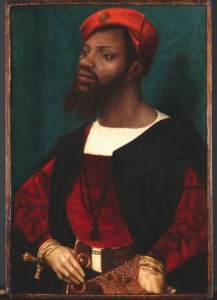The Tudor period was significant for black settlement in England. Katherine of Aragon arrived at Plymouth in October 1501 with a multinational entourage that included Moors, Muslims and Jews. The Iberian Moor Catalina de Cardones was one member of Katherine’s entourage, and served her for twenty-six years as Lady of the Bedchamber. She eventually married ‘Hace Ballestas’, a crossbowman who was also of Moorish origin. Alongside the arrival of ‘Black Moors’ from Spain and North Africa, this period witnessed the arrival of black people on a major scale as a result of the burgeoning slave trade. The National Archives at Kew contains a wealth of fascinating resources concerning Tudor Africans. Albeit from a slightly later date, during Stuart rule, on 29 September 1687 a Moor was granted the freedom of the city of York, and is listed in the freemen’s roll as ‘John Moore – blacke’, although he is occasionally referred to as ‘Johannes Moore’. Freedom of the city could be obtained through earning it (through serving an apprenticeship, for example); inheriting it from a parent who was a freeman; purchasing it; or receiving it as a reward for services rendered to the city. In this case, John Moore bought the freedom of the city. He paid two amounts: 20 nobles (equivalent to 13s 6d) to the Common Chamber of the city of York, and £4 to the city council, for his honour. It has been conjectured that John Moore was a wealthy member of the York community, since he was in a position to pay the requisite amount of money to the mayor of York to enjoy all the privileges of freedom of the city. He was able to bear arms and enjoyed the right to fish in the city’s rivers and was also able to graze his animals on the meadows by virtue of his freemen status. While Moore’s experiences seem to have been exceptional – no other black man or woman has been, to date, found in the York rolls – this example compellingly demonstrates the visibility, importance and potential for power of black people in England at this time. (Read more.)Share
I Love Lent
10 hours ago


















No comments:
Post a Comment